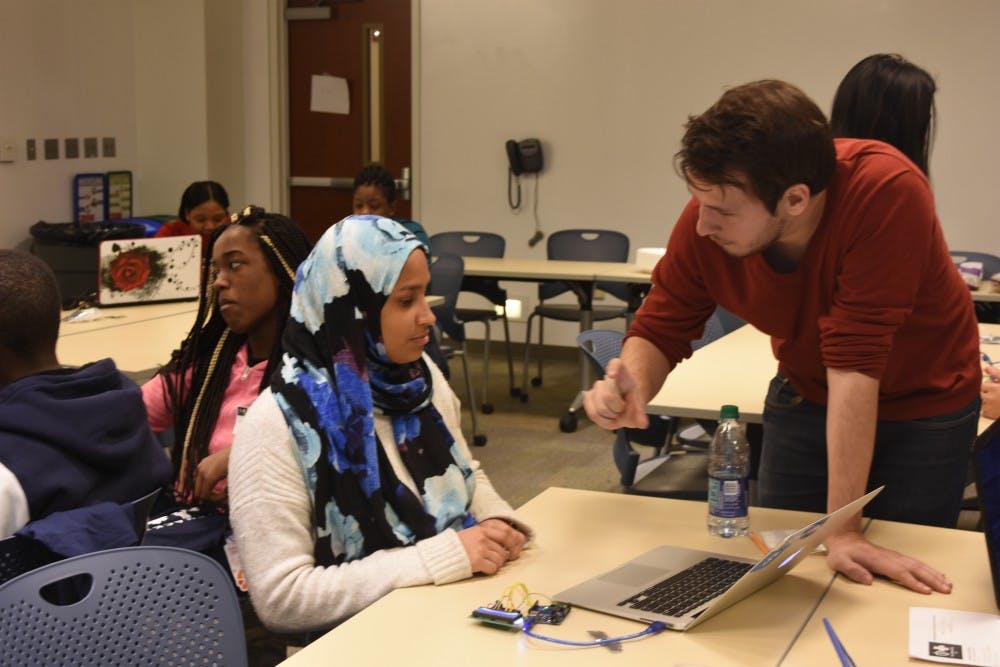On Saturday, April 7, MedHacks hosted its first Mini-MedHacks event, involving 30 high school seniors from schools around Baltimore. MedHacks hosts an annual medical hackathon at Hopkins, and Mini-MedHacks 2018 was intended to provide younger students with a similar experience.
MedHacks collaborated with Medical Education Resources Initiative for Teens (MERIT), a Baltimore-area non-profit organization that aims to support high school students interested in healthcare, to design the event. The participants were all members of MERIT.
Mini-MedHacks was a full-day event held at the Hopkins School of Nursing, and it involved speakers, student problem-solving sessions, and presentations and workshops for the participants.
The theme of the event was emergency medicine, and the solutions the students designed were targeted toward problems in that field, such as wait times and patient-doctor communication.
Two keynote speakers opened the event. Amir Manbachi, associate director of the undergraduate program at the Center for Bioengineering Innovation and Design at Hopkins and the founder of Spinesonics Medical Inc., discussed his experiences in engineering and entrepreneurship, especially as they related to medical technology.
Dr. Junaid Razzak, a professor in the Department of Emergency Medicine at the Hopkins School of Medicine, spoke on the topic of emergency medicine and potential areas of interest for the students within it.
“The students built off these presentations and used them as inspiration for their own hacks,” sophomore Katherine Hu, director of Mini-MedHacks 2018, said in an interview with The News-Letter.
Students were, however, allowed to choose problems and design solutions they found through their own independent research.
Students were also given the opportunity to attend two workshops, one on Sketchware, an app-developing platform, and another on Arduino, which can be used to build electronics projects.
Given the limited time frame of the event, participants were not required to create an actual product.
“We wanted to emphasize the whole design process, from coming up with a problem and then researching the problem and then finally coming up with some sort of solution,” Hu said. “The solution didn’t need to be an actual product, most of them created apps, and just gave us the storyboard for the app, how the app would work.”
Since the students worked in groups, there was also an emphasis on effective cooperation and communication between the members of a team. Around 20 undergraduate members of MedHacks served as mentors to assist the students.
The event culminated with presentations from the teams, which involved a five-minute pitch in front of three judges from MERIT, and a Q&A session, during which the audience was also allowed to ask questions. Solutions were judged on feasibility, effectiveness and creativity, and the students’ productiveness as a team was also taken into consideration.
Solutions involved apps to decrease emergency room wait times and to allow doctors to communicate with their patients after discharge from the emergency department. MedBook, the winning team, designed an app that would match patients and doctors.
“The students underwent a few idea iterations and reached a consensus to work on communication with doctors,” sophomore Nick Garza, a MedHacks volunteer at the event who was a mentor for MedBook, said. “After all of their planning, the easier part was implementing their ideas to pitch a web-based service inspired by their exposure to app development.”
MedHacks intends for Mini-MedHacks to become an annual occurrence and is interested in expanding the event itself.
“In the future, we would definitely want to make this event bigger and allow more students to experience this whole design process. I think we would probably also make the presentations a little bit longer in the end, so the students have more time to talk about their work,” Hu said.
MedHacks anticipates reaching out to other Baltimore-area organizations, in addition to MERIT, in the near future.
“After this event, I think our next step is to see what other partnerships we can forge with other institutions,” Hu said. “Community outreach has definitely become more of a priority for us.”





